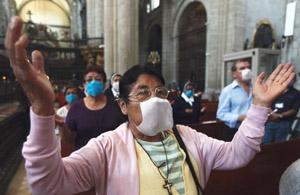
The swine flu, which began in March in Mexico, has spread into the United States and other parts of the world. It was not at a pandemic level at press time April 28, said Deacon Frank Agnoli of the Diocese of Davenport. Deacon Agnoli, the chancery’s safety officer, met with its Disaster Committee that day to discuss the evolving world health situation. No cases of swine flu had been reported in Iowa at that point.
According to the Centers for Disease Control (CDC), the swine flu is a respiratory disease in pigs, similar to the flu that hits the U.S. in the fall and winter.
Because of a mutation, this strain of the swine flu virus is more easily transmitted to humans and between people. It is a respiratory virus (spread by coughing and sneezing, or touching a surface with flu virus on it and then touching your mouth, nose, or eyes). It is not spread by eating properly cooked pork, Deacon Agnoli said in an information flyer sent by mail to parishes.
Because it is a new virus, there is no vaccine for this strain of swine flu. However, this strain seems to be susceptible to the newer anti-viral drugs such as Tamiflu and Relenza, he said.
He emphasized the need for good hand washing. Also, those who are feeling ill should stay home. Use common sense; be prepared — but don’t panic, he added.
The Disaster Committee advises the people of the diocese to stay informed because of the rapidly evolving situation. “While the news media will continue to publicize more and more outbreaks, keep a level head,” Deacon Agnoli said.
The diocesan Web site www.davenportdiocese.org/disaster/index.htm and CDC Web site www.cdc.gov/swineflu offer resources and updates on its spread.
The diocese also reminds parishioners to review hygiene techniques: Cover your mouth and nose when you cough or sneeze. Properly dispose of any tissues. Clean your hands. Avoid touching your eyes, nose or mouth.
The diocese is not calling for any pastoral or liturgical changes. Policies are written that pastors and parish staff can refer to if the need arises.
Deacon Agnoli and Deacon David Montgomery, the diocese’s communications director, stress that parishes don’t need to put away the holy water or the chalice. “We are not calling for any changes in pastoral or liturgical practices,” Deacon Agnoli said. “However, this is a good time to begin preparing for a possible outbreak.” But such preparations are helpful with seasonal flu as well as in other emergencies, he added.
He advised parishes to be aware of any vulnerable populations, such as the elderly, disabled, chronically ill and homeless within the parish. They may need extra assistance in accessing resources should a pandemic occur. Those ministers who take Communion to the sick are a great resource in assessing those needs.
Deacon Agnoli reminded parishes to be aware of other opportunities for local outreach, such as food banks, a hotline for coordinating volunteers and those in need, and offering support to local health agencies.
He also encouraged people to remember the importance of good self-care. “Parish priests and other ministers may be overwhelmed, offer guidance and resources as available,” he said.








